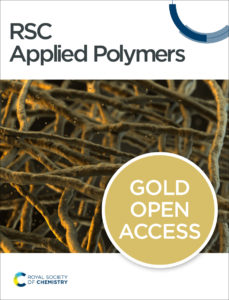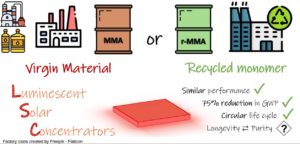RSC Applied Polymers has published its first articles. To celebrate this we wish to introduce some of our #RSCAppliedfirst50 authors and their recently published articles.
In this post we feature an introduction to Assessing the performance of sustainable luminescent solar concentrators based on chemically recycled poly(methyl methacrylate) by Alberto Picchi, Marco Carlotti, Andrea Pucci et al.
An Introduction to Assessing the performance of sustainable luminescent solar concentrators based on chemically recycled poly(methyl methacrylate) by Alberto Picchi, Marco Carlotti, Andrea Pucci et al.
Sunlight concentration is one of the most straightforward means to improve the performances of photovoltaics and reduce the extension of the modules needed to produce a certain quantity of energy.
Compared to large parabolic systems that find applications in solar fields, other solar concentration methods are better suited for urban areas, such as Luminescent Solar Concentrators (LSCs). Visually, LSCs resemble glass panels with bright fluorescent colours and luminescent sides. They utilize fluorescent molecules or particles to absorb and re-emit solar radiation, concentrating it towards the device’s edges thanks to an optical phenomenon called total internal reflection. There, thin photovoltaic cells, as vast as the small thickness of the panel, convert this light into electricity.
Amorphous polymers like polycarbonates or polyacrylates, known to serve as excellent substitutes for glass due to their high transparency and mechanical strength, are also ideal matrices for application in LSCs. Poly(methyl methacrylate) (PMMA), in particular, offers additional advantages such as low cost, an optimal refractive index to waveguide light, and the possibility of hosting several luminescent materials without affecting their optical performances.
The large-scale adoption of this technology – which in urban areas and as visually appealing build-in photovoltaics in buildings – would cause the introduction in the market of a significant amount of plastic, the environmental production impact of which cannot be overlooked, especially since it is higher than that of the attached photovoltaics modules.
One advantage of PMMA is that it can be recycled through thermal depolymerization processes, which regenerate the initial monomer (methyl methacrylate, MMA) with high efficiency and little impurities.
The use of regenerated MMA, instead of virgin monomer, for the production of Luminescent Solar Concentrators (LSCs) could reduce the impact of production by about 75% and make it possible to imagine a circular life cycle of these devices without increasing costs. However, impurities can drastically affect the performances and lifetime of the devices, making this approach ineffective.
In this study, Alberto Picchi, Marco Carlotti and Andrea Pucci from the Department of Chemistry and Industrial Chemistry at the University of Pisa, in collaboration with I&S Srl, explored the possibility of using recycled monomers instead of virgin ones to fabricate LSC plates, making this technology more accessible and sustainable. In particular, they found that, while characteristic impurities or regenerated monomers do not seem to affect performances, they promote the photodegradation process, shortening the devices’ expected lifespan. During the investigation, they also identified the main substance responsible for this effect, which will need to be removed from the recycled monomer to fabricate devices capable of spanning more than 10 years.

Alberto Picchi
Mr. Alberto Picchi is a Ph.D. student in Chemistry and Materials Science at the University of Pisa (Italy). He obtained his MChem (2019) from the same institution. Alberto’s research focuses on developing luminescent devices based on recycled polymers for harvesting solar and artificial light.

Marco Carlotti
Dr Marco Carlotti obtained his PhD from the University of Groningen (The Netherlands) in 2019, and he is currently an Assistant Professor at the Dipartimento di Chimica e Chimica Industriale of the University of Pisa (Italy) and a Scientific Collaborator at the Istituto Italiano di Tecnologia (Italy). His research revolves around the use of smart polymeric systems for energy application and in microfabrication.

Andrea Pucci
Prof. Andrea Pucci is a full professor of industrial chemistry and the Dipartimento di Chimica e Chimica Industriale at the University of Pisa (Italy). His scientific interests are expressed in polymer science, with particular attention to the preparation of mono-or multiphase polymer (nano)systems with functional properties for applications as chromogenic materials responsive to external stimuli of various kinds or for applications in the energy field. Since November 2016, he is a fellow of the Royal Society of Chemistry. He is now serving as Associate Editor of the RSC Advances.
RSC Appl. Polym., 2024, Advance Article. DOI: 10.1039/D4LP00067F
 |
RSC Applied Polymers is a leading international journal for the application of polymers, including experimental and computational studies on both natural and synthetic systems. In this journal, you can discover cross-disciplinary scientific research that leverages polymeric materials in a range of applications. This includes high impact advances made possible with polymers across materials, biology, energy applications and beyond. |




